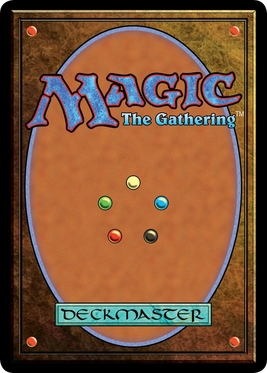
Magic: The Gathering
Magic: The Gathering (colloquially known as Magic or MTG) is a tabletop and digital collectible card game created by Richard Garfield.[1] Released in 1993 by Wizards of the Coast, Magic was the first trading card game and had approximately fifty million players as of February 2023.[2][3][4][5] Over twenty billion Magic cards were produced in the period from 2008 to 2016, during which time it grew in popularity.[6][7] As of the 2022 fiscal year, Magic generates over $1 billion in revenue annually.[5][8]
Designer
August 5, 1993
2 or more
13+
Some (order of cards drawn, varying card abilities)
Players in a game of Magic represent powerful, dueling wizards called Planeswalkers. Each card a player draws from their deck represents a magical spell which can be used to their advantage in battle. Instant and Sorcery cards represent magical spells a player may cast for a one-time effect, while Creature, Artifact, and Enchantment cards remain on the Battlefield to provide long-term advantage. Additionally, players must include resource, or Land cards representing the amount of magic that is available to cast their spells. Typically, a player defeats their opponent(s) by reducing their life totals to zero, which is commonly done via combat damage, or attacking with creatures. Many other sources of damage exist in the game, however, in addition to alternative win-conditions which do not check life totals.
Although the original concept of the game drew heavily from the motifs of traditional fantasy role-playing games such as Dungeons & Dragons, the gameplay bears little similarity to tabletop role-playing games, while simultaneously having substantially more cards and more complex rules than many other card games.
Magic can be played by two or more players, either in person with paper cards or on a computer, smartphone or tablet with virtual cards through Internet-based software such as Magic: The Gathering Online, Magic: The Gathering Arena, Magic Duels and several others. It can be played in various rule formats, which fall into two categories: constructed and limited. Limited formats involve players building a deck spontaneously out of a pool of random cards with a minimum deck size of 40 cards;[9] in constructed formats, players create decks from cards they own, usually with a minimum of 60 cards per deck.
New cards are released on a regular basis through expansion sets. Further developments include the Wizards Play Network played at the international level and the worldwide community Players Tour, as well as a substantial resale market for Magic cards. Certain cards can be valuable due to their rarity in production and utility in gameplay, with prices ranging from a few cents to tens of thousands of dollars.
Reception[edit]
Critical reviews[edit]
Scott Haring reviewed Magic: The Gathering in Pyramid #4 (Nov./Dec., 1993), and stated that "Not only is Magic the best gaming bargain to come down the pike in memory; not only is it the most original idea in years; it's also a delightfully addictive game that you and your friends will find impossible to put down."[155] Marcelo A. Figueroa reviewed the game in a 1993 issue of Space Gamer/Fantasy Gamer, noting both positives and negatives, stating that, "despite all of its flaws, it's as endearing as Star Fleet Battles".[156] Overall, Figueroa rated the game a 7 out of 10.[156]
A 2004 article in USA Today suggested that playing Magic might help improve the social and mental skills of some of the players. The article interviewed players' parents who believe that the game, similar to sports, teaches children how to more gracefully win and lose. Magic also contains a great amount of strategy and vocabulary that children may not be exposed to on a regular basis. Parents also claimed that playing Magic helped keep their children out of trouble, such as using illegal drugs or joining criminal gangs. On the other hand, the article also briefly mentions that Magic can be highly addictive, leading to parents worried about their children's Magic obsession.[157] In addition, until 2007, some of the better players had opportunities to compete for a small number of scholarships.[158]
Jordan Weisman, an American game designer and entrepreneur, commented